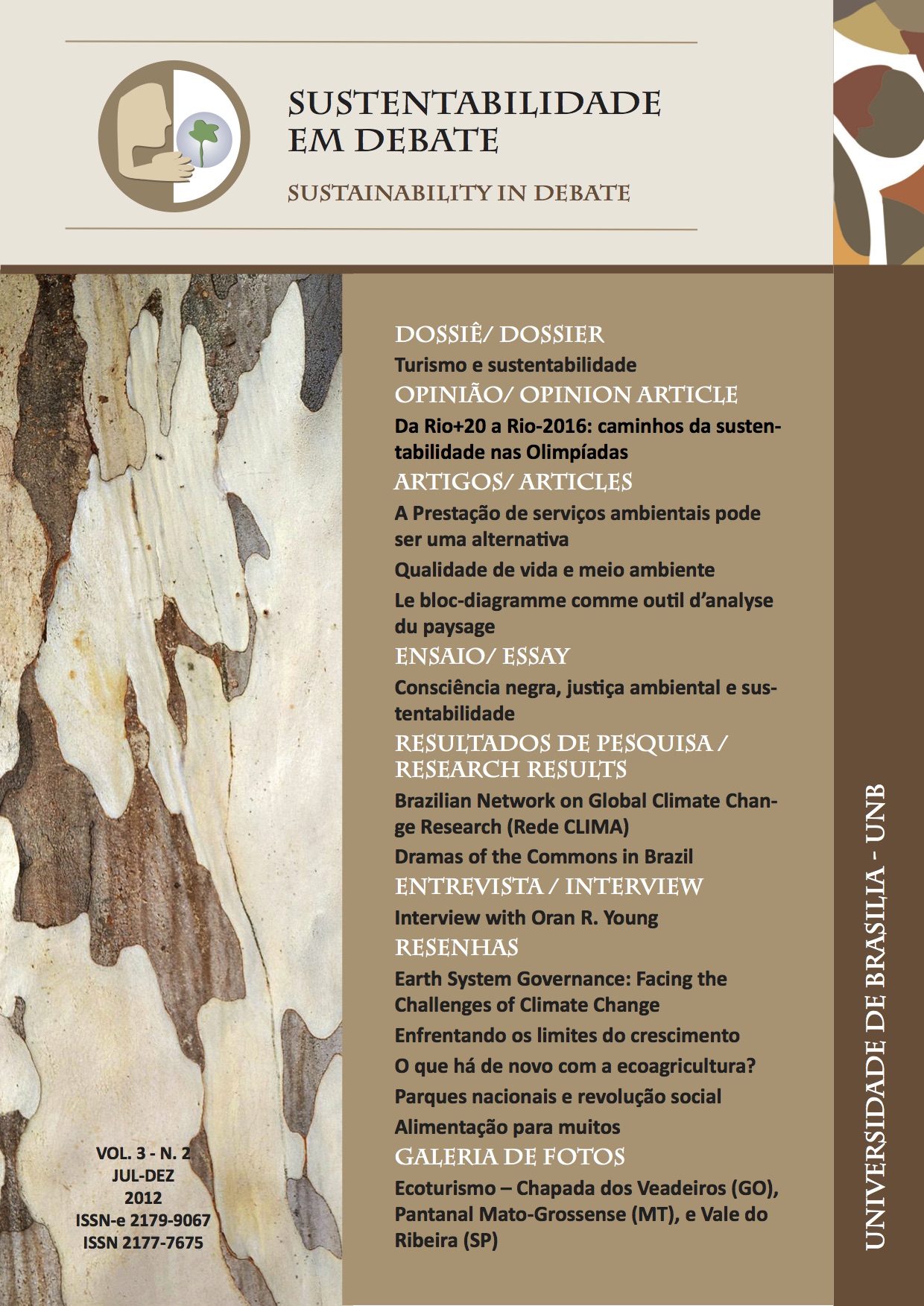Mergulhando em memórias, tecendo culturas e construindo histórias:
o diálogo entre a história e o turismo de base comunitária
DOI:
https://doi.org/10.18472/SustDeb.v3n2.2012.8127Keywords:
Community-Based Tourism, Historical Research, Dialogic RelationshipAbstract
The objective of this paper is to discuss the dialogical relationship between historical research and community-based tourism (TBC). This is done through the analysis of the sustainability aspects of the social, cultural, and historical memory in contexts which reveal dialectical processes of knowledge construction. In this regard, it is noteworthy that studies on historical research focused on the implementation of community-based tourism are innovative, interdisciplinary and therefore incipient. As such, they reveal elements that represent a theoretical-methodological basis for the used referencials, including a contextualized analysis of an outreach project of the University of Bahia (UNEB) on community-based tourism, developed at the city of Cabula and its surroundings in Salvador, Bahia state. Conclusions reveal potentialities in historical research, as evidenced by the close association of the studied actors, practices and topics.
Downloads
References
das tipologias turísticas à segmentação de mercado. In Panosso Neto, A., & Ansarah,
M. G. dos R. (Ed.). Segmentação do Mercado Turístico: estudos, produtos e perspectivas.
Barueri, SP: Manole, 2009.
CARRETERO, M.. Construir e ensinar as ciências sociais e a história. (B. A. Neves
Trad.). Porto Alegre: Artes médicas, 1997.
GASPARSKI, W., & AIRAKSINEN, T.. Praxiology ande the philosophy of technology.
New Jersey: Transaction Publishers, 2008.
GRAMSCI, A. Concepção dialética da história. 3ed. C.N. Coutinho Trad. Ed. Rio de
Janeiro: Civilização Brasileira S. A., 1978.
MALDONADO, C. . O turismo rural comunitário na América Latina: gênesis, características
e políticas. In: Bartholo, R., Sansolo, D. G., & Bursztyn, I.(Org.). Turismo
de Base Comunitária: diversidade de olhares e experiências brasileiras. Rio de Janeiro:
Letra e imagen, 2009.
MARTINEAU, Robert. L’Echec de l’ apprentissage de la pensée historique á l’école
secondaire. Contribuition à l’ elaboration de fondaments didatiques pour enseigner
l´Histoire. 1997. Tese (Doutorado em Educação) ”“ Université Laval. Quebec.
MATTA, A. E. R. Procedimentos de autoria hipermídia em rede de computadores:
um ambiente mediador para o ensino aprendizagem de História. Salvador. Tese de
doutorado, Faculdade de Educação, Universidade Federal da Bahia, Salvador, BA,
Brasil, 2001.
MATTA, A. E. R. Tecnologias de aprendizagem em rede e ensino de história ”“ utilizando
comunidades de aprendizagem e hipercomposição. Brasília: Líber Livro Editora,
2006.
MINISTÉRIO DO TURISMO DO BRASIL. Turismo cultural: orientações básicas. Brasília:
MTUR.2010.
NASCIMENTO, A. C. N. do, & Carvalho, J.C.. O Turismo Comunitário como fator de
desenvolvimento local: o caso da comunidade Barro vermelho ”“ Parnaíba/PI. Anais
do Seminário Internacional de Turismo Sustentável, Fortaleza, CE, Brasil, 2. Recuperado
em 23 nov.,2010,de http://www.cdvhs.org.br/sispub/image-data/1893/sits/
files/O%20TURISMO%20COMUNITARIO%20COMO% 20FATOR% 20DE%20
DESENVOLVIMENTO%20LOCAL, 2008.
RIBEIRO, M. Turismo comunitário: relações entre anfitriões e convidados. In Panosso
Neto, A., & Ansarah, M. G. dos R. Ed. Segmentação do Mercado Turístico: estudos,
produtos e perspectivas. Barueri, SP: Manole, 2009.
VIEIRA, M. do P., Peixoto, M. do R. da C. & Khoury, Y. M. A.. A pesquisa em história.
5ª.ed. São Paulo: Ática., 2007.
VIGNATTI, F. . Gestão de destinos turísticos. Rio de Janeiro: SENAC, 2008.
Downloads
Published
How to Cite
Issue
Section
License
SUSTAINABILITY IN DEBATE – Copyright Statement
The submission of original scientific work(s) by the authors, as the copyright holders of the text(s) sent to the journal, under the terms of Law 9.610/98, implies in the concession of copyrights of printed and/or digital publication to the Sustainability in Debate Journal of the article(s) approved for publication purposes, in a single issue of the journal. Furthermore, approved scientific work(s) will be released without any charge, or any kind of copyright reimbursement, through the journal’s website, for reading, printing and/or downloading of the text file, from the date of acceptance for publication purposes. Therefore, the authors, when submitting the article (s) to the journal, and gratuitous assignment of copyrights related to the submitted scientific work, are fully aware that they will not be remunerated for the publication of the article(s) in the journal.
The Sustainability in Debate Journal is licensed under Creative Commons License – Non-Commercial-No-Derivation Attribution (Derivative Work Ban) 3.0 Brazil, aiming at dissemination of scientific knowledge, as indicated on the journal's website, which allows the text to be shared, and be recognized in regards to its authorship and original publication in this journal.
Authors are allowed to sign additional contracts separately, for non-exclusive distribution of the works published in the Sustainability in Debate Journal (for example, in a book chapter), provided that it is expressed the texts were originally published in this journal. Authors are allowed and encouraged to publish and distribute their text online, following publication in Sustainability in Debate (e.g. in institutional repositories or their personal pages). The authors expressly agree to the terms of this Copyright Statement, which will be applied following the submission and publishing by this journal.





